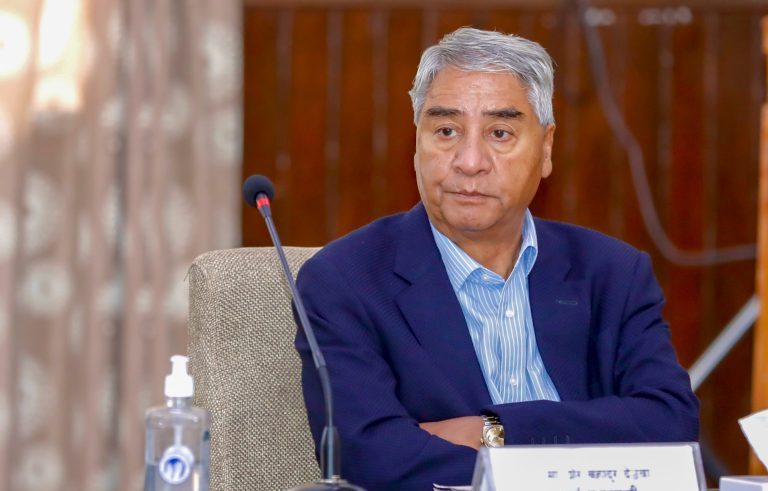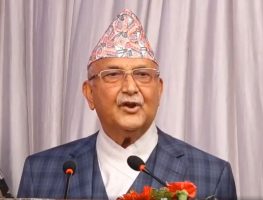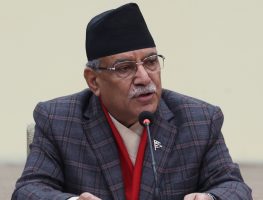
SHER BAHADUR DEUBA
Sher Bahadur Deuba, born on 13 June 1946 in the remote village of Ashigram in Dadeldhura, Nepal, is a prominent Nepali politician.
He has a rich political history, having served as the prime minister of Nepal for five terms (1995–1997, 2001–2002, 2004–2005, 2017–2018, and 2021–2022) and as the president of the Nepali Congress since 2016.
Deuba is also the Member of Parliament for Dadeldhura-1.
Raised in Ashigram, Deuba completed his primary education there and pursued his secondary education in Doti.
He continued his higher education at Tri-Chandra College.
In 1991, he entered the House of Representatives and held the position of Minister of Home Affairs in Girija Prasad Koirala’s cabinet.
Deuba’s political journey includes significant milestones, such as overseeing the Mahakali treaty with India during his first term as prime minister.
During his second premiership in 2001, amidst the rise of the Maoists, he declared a state of emergency and labeled the Communist Party of Nepal (Maoist) as a “terrorist organization.”
Dismissed by King Gyanendra in October 2002, Deuba was reappointed as prime minister in June 2004 following a public backlash.
He faced arrest after the 2005 coup d’état by King Gyanendra but was released in February 2006 when the Supreme Court deemed his arrest unlawful.
In June 2017, Deuba was sworn in as prime minister for the fourth time as part of a rotational government agreement between the Congress and the CPN (Maoist Centre).
His government successfully conducted elections at all three levels of government in 2017.
On 12 July 2021, the Supreme Court mandated Deuba’s appointment as prime minister within 28 hours, and he assumed the role for the fifth time the next day, following Article 76(5) of the Constitution of Nepal.
Sher Bahadur Deuba is married to Arzu Rana Deuba, and they have one son.
His early life in Ashigram, educational journey, and political career demonstrate his dedication to the Nepali political landscape, starting as a student activist and eventually becoming a prominent leader in the country.
On February 12, 1996, Sher Bahadur Deuba signed the Mahakali treaty with the Government of India, focusing on the development of the Mahakali River watershed.
His administration, marked by the onset of the Maoist insurgency, came to an end in March 1997.
Lokendra Bahadur Chand succeeded him, leading a minority coalition government.
Second Prime Ministerial term:
Following Girija Prasad Koirala’s resignation as prime minister, Deuba emerged victorious over Sushil Koirala in the Nepali Congress parliamentary party leadership race.
On July 26, 2001, he was appointed prime minister for the second time.
His tenure coincided with the royal massacre and the height of the Maoist insurgency.
Deuba initiated a ceasefire with the Communist Party of Nepal (Maoist) and engaged in peace talks.
However, after the Maoists withdrew from negotiations and attacked the army in November 2001, Deuba declared a state of emergency, designating the Maoists as a “terrorist organization.”
In early 2002, Deuba sought the dissolution of the parliament for fresh elections and founded the breakaway party, Nepali Congress (Democratic).
King Gyanendra took over the democratically elected government in October 2002.
Third Prime Ministerial term:
After two intervening governments, Deuba was reappointed as prime minister by King Gyanendra on June 4, 2004.
In 2005, following the Nepal coup d’état by the king, Deuba and his cabinet were placed under house arrest.
He was sentenced to two years in prison but released in February 2006 after the Supreme Court outlawed the prison sentence.
In September 2007, Deuba dissolved his splinter party and rejoined the Nepali Congress.
2008 Constituent Assembly election:
Deuba won both Dadeldhura 1 and Kanchanpur 4 constituencies in the Constituent Assembly election held on April 10, 2008.
However, he was defeated in the subsequent vote for prime minister on August 15, 2008.
First term as Nepali Congress President:
In 2016, Deuba was elected president of the Nepali Congress, defeating Ram Chandra Poudel at the party’s thirteenth general convention.
He struck a deal with Pushpa Kamal Dahal in August 2016 to lead a rotational government, serving as prime minister for a fourth stint from June 7, 2017.
He resigned on February 15, 2018, paving the way for KP Sharma Oli to become prime minister.
Fifth Prime Ministerial term:
After the failure of prime minister KP Sharma Oli to secure a vote of confidence in the House of Representatives, Deuba was asked by the opposition alliance to be appointed prime minister.
On July 12, 2021, the Supreme Court ruled in favor of Deuba, and he was appointed prime minister for the fifth term on July 13, 2021, following the Constitution of Nepal.
He won a vote of confidence in the House of Representatives on July 18, 2021, securing his government’s position until the next general elections in late 2022.
Second term as Nepali Congress President:
Refer also to the 14th general convention of Nepali Congress.
Sher Bahadur Deuba secured his second term as the party president of Nepali Congress.
Initially, the first round of voting did not produce a winner, as no candidate managed to secure the required 51% of votes according to the party’s constitution.
The situation turned challenging for Deuba when his close confidant and party vice president, Bimalendra Nidhi, entered the race.
In the subsequent round, Deuba clinched the presidency for the second time with the support of Prakash Man Singh and Bimalendra Nidhi.
Garnering almost 60% of the votes, Deuba was re-elected as the party president for his second term.
Personal life:
Sher Bahadur Deuba is married to Arzu Rana Deuba and is a father to a son named Jaiveer Singh.
In November 2016, Deuba was honored with an honorary doctorate degree by Jawaharlal Nehru University in India.[69]
Electoral history:
Sher Bahadur Deuba’s electoral journey includes victories in the House of Representatives from Dadeldhura 1 in 1991, 1994, 1999, and 2017 under the Nepali Congress banner.
He emerged victorious in Dadeldhura 1 during both the 2008 and 2013 Constituent Assembly elections.
In the 2008 CA election, he contested and won from two constituencies, subsequently relinquishing his Kanchanpur 4 seat.



